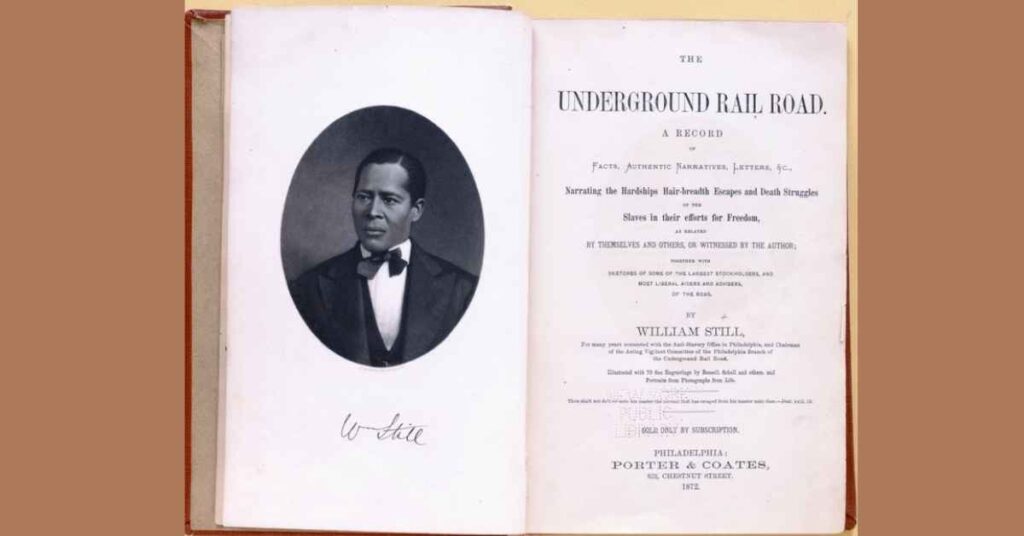This excerpt from “The Underground Railroad” documents the arrival of Isaac Forman to the Philadelphia station on the Underground Railroad and his grief on leaving his wife behind.
You will read a heart-breaking letter from the young man with his deepest wish that a way can be found for his wife to follow him.
About The Book
“The Underground Railroad” was published in 1872. The book gives the testimonies of hundreds of slaves who escaped to freedom using the network of agents and safe houses.
The author, William Still, was a black abolitionist and businessman who was a key member of the Philadelphia stop in the freedom network.
The book is in the public domain. It can be found in the Library of Congress.

Excerpt – Account Of Isaac Forman
[The headings and text in italics were added by the website editor. The rest is verbatim from the book]
Three fugitives had arrived in Philadelphia together. and were helped by the local Underground Railroad committee. The acronym U.G.R.R. refers to “Underground Railroad”.
These passengers all arrived together, concealed, per steamship City of Richmond, December, 1853.
Isaac Forman, the youngest of the party – twenty-three years of age and a dark mulatto – would be considered by a Southerner capable of judging as “very likely.”
He fled from a widow by the name of Mrs. Sanders, who had been in the habit of hiring him out for “one hundred and twenty dollars a year.” She belonged in Norfolk, Va.; so did Isaac.
For four years Isaac had served in the capacity of steward on the steamship Augusta.
He stated that he had a wife living in Richmond, and that she was confined the morning he took the U.G.R.R. Of course he could not see her. The privilege of living in Richmond with his wife “had been denied him.”
Thus, fearing to render her unhappy, he was obliged to conceal from her his intention to escape.
“Once or twice in the year was all the privilege allowed” him to visit her. This only added “insult to injury,” in Isaac’s opinion; wherefore he concluded that he would make one less to have to suffer thus, and common sense said he was wise in the matter.
No particular charges are found recorded on the U.G.R.R. books against the mistress. He went to Canada.
Excerpt – Letter From Isaac Concerning His Wife
TORONTO, May 7,1854.
MR. W. STILL:
Dear Sir
[…]
My soul is vexed, my troubles are inexpressible. I often feel as if I were willing to die.
I must see my wife in short, if not, I will die. What would I not give no tongue can utter. Just to gaze on her sweet lips one moment I would be willing to die the next.
I am determined to see her some time or other. The thought of being a slave again is miserable. I hope heaven will smile upon me again, before I am one again.
I will leave Canada again shortly, but I don’t name the place that I go, it may be in the bottom of the ocean.
If I had known as much before I left, as I do now, I would never have left until I could have found means to have brought her with me.
You have never suffered from being absent from a wife, as I have. I consider that to be nearly superior to death, and hope you will do all you can for me, and inquire from your friends if nothing can be done for me.
Please write to me immediately on receipt of this, and say something that will cheer up my drooping spirits.
You will oblige me by seeing Mr. Brown and ask him if he would oblige me by going to Richmond and see my wife, and see what arrangements he could make with her, and I would be willing to pay all his expenses there and back.
Please to see both Mr. Bagnel and Mr. Minkins, and ask them if they have seen my wife.
I am determined to see her, if I die the next moment. I can say I was once happy, but never will be again, until I see her; because what is freedom to me, when I know that my wife is in slavery?
[…]
I remain evermore your obedient servant,
I. FORMAN.
Aftermath
In some of these excerpts, I have been able to add notes of what became of the people involved.
Unfortunately, William Still’s book has no further information on the fate of Isaac Forman’s wife.